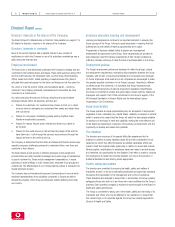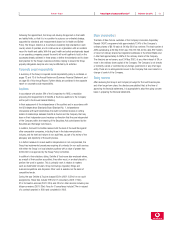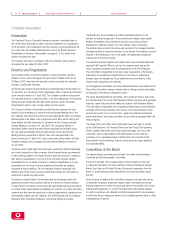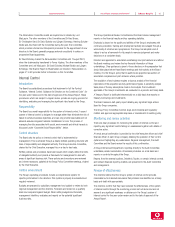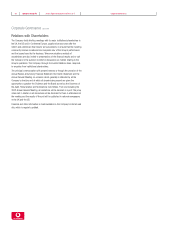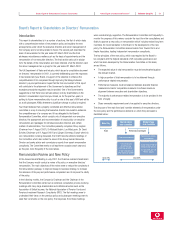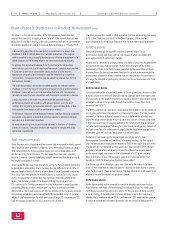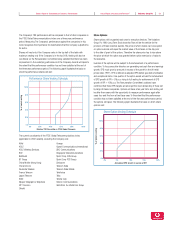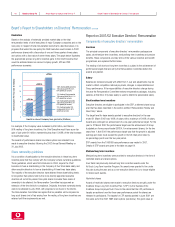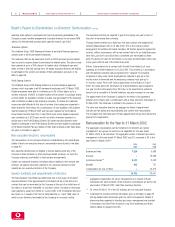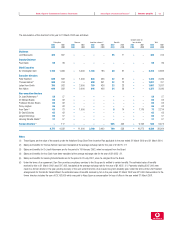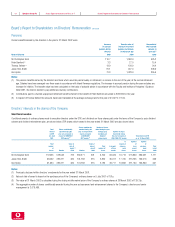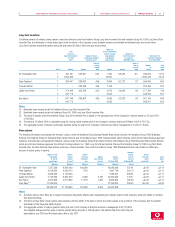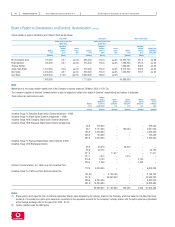Vodafone 2002 Annual Report Download - page 60
Download and view the complete annual report
Please find page 60 of the 2002 Vodafone annual report below. You can navigate through the pages in the report by either clicking on the pages listed below, or by using the keyword search tool below to find specific information within the annual report.
The Board, on the recommendation of the Remuneration Committee, has
adopted the new policy to apply as from the start of the current financial year
(2002/2003) and the following is the policy statement that will be submitted for
an advisory shareholder vote at the Annual General Meeting on 31 July 2002:
Total remuneration levels
Under the new policy, Vodafone will benchmark total remuneration levels against
other large European parented companies, using externally provided pay data.
Total remuneration for these purposes means the sum of base salary, short,
medium and long term incentives. The European focus has been selected
because Europe is currently Vodafone’s biggest market and Vodafone is one of
the largest companies in Europe.
Award levels for the Chief Executive will be set by the Remuneration Committee
to deliver total remuneration that is between the top 25% and the top 10% of
the remuneration levels of other chief executives of large European companies.
This range has been selected to reflect Vodafone’s relative size in this region
and to recognise that Vodafone also has significant interests outside of the
region. The monetary values of the market data for this range are from
£3.4 million to £9.3 million per annum for chief executives of large European
companies. Awards of short, medium and long term incentives have been
determined so that these levels would only be delivered if the Company achieves
exceptionally demanding performance levels. The equivalent range of monetary
values of total remuneration for chief executives of large US companies and US
high technology companies is £22.5 million to £45.5 million.
Vodafone Group Plc Annual Report & Accounts and Form 20-F Board’s Report to Shareholders on Directors’ Remuneration58
Board’s Report to Shareholders on Directors’ Remuneration continued
The total remuneration levels of other executive directors will be at approximately
65% of the Chief Executive level for the Chief Operating Officer and at
approximately 50% of the Chief Executive level for the other executive directors.
Incentive awards
Executive directors will be eligible to receive a deferred share bonus,
performance shares and share options, the release of which are dependent
upon achievement of performance targets.
Awards will be delivered in ordinary shares of Vodafone Group Plc. All awards will
be made under plans that incorporate dilution limits that are set out in the
Guidelines for Share Incentive Schemes published by the Association of British
Insurers. These Guidelines have been developed to provide a framework for the
development of share incentive schemes that link remuneration to performance
and align the interests of participating directors and senior executives with those
of shareholders.
Deferred share bonus
This short/medium term incentive is aimed at focusing executive directors on the
business priorities for the next financial year. No changes have been made under
the new policy to this aspect of Vodafone’s executive director remuneration policy
which will continue to be provided through the Vodafone Group Short Term
Incentive Plan (“STIP”).
The STIP comprises two elements: a base award that is determined by reference
to one-year performance targets and an enhancement award. The base award is
delivered in the form of shares, receipt of which is deferred for a further two
years. An enhancement award of up to 50% of the number of shares comprised
in the base award may be payable, subject to the achievement of a subsequent
two-year performance target following the initial twelve-month period. Release of
the base award and the enhancement award after the total three-year period is
dependent upon the continued employment of the participant.
Demanding base award performance targets are set annually by the
Remuneration Committee and are linked to business strategy. For the current
year, the performance measures are related to EBITDA, free cash flow and ARPU.
The targets are not disclosed as they would give clear indication of Vodafone’s
budgetary targets which are share price sensitive. The enhancement award
performance targets are related to the achievement of EPS growth targets.
More information on the STIP awards is given in the following section that
reports on 2001/2002 executive directors’ remuneration.
The Group may, at its discretion, pay a cash sum up to the value of the base
award in the event that an executive director declines the base award of shares
after the first year. In these circumstances, the executive director will cease to be
eligible to receive the related enhancement award.
Performance shares
Performance shares will be awarded to executive directors each year to align
their interests with those of shareholders. The Vodafone Group Plc 1999 Long
Term Stock Incentive Plan will be the vehicle for the provision of these incentive
awards. Vesting of the performance shares will depend upon the Company’s
relative total shareholder return (“TSR”) performance. TSR measures the change
in value of a share and reinvested dividends over the period of measurement.
The overriding objective of the new policy on incentives is to ensure that
Vodafone is able to attract, retain and motivate executives of the highest
calibre essential to the successful leadership and effective management of a
global company at the leading edge of the telecommunications industry.
To achieve this objective, Vodafone, from the context of its UK domicile,
takes into account both the UK regulatory framework, including best practice
in corporate governance, shareholder views, political opinion and the
appropriate geographic and nationality basis for determining competitive
remuneration, recognising that this may be subject to change over time as
the business evolves.
The total remuneration will be benchmarked against the relevant market.
Vodafone is one of the largest companies in Europe and is a global business;
Vodafone’s policy will be to provide executive directors with remuneration
generally at levels that are competitive with the largest companies in Europe.
A high proportion of the total remuneration will be awarded through
performance-related remuneration, with phased delivery over the short,
medium and long term. For executive directors, approximately 80% of the
total expected remuneration will be performance-related.
Performance measures will be balanced between absolute financial measures
and sector comparative measures to achieve maximum alignment between
executive and shareholder objectives.
All medium and long term incentives are delivered in the form of Vodafone
shares and options. Executive directors are required to comply with share
ownership requirements.






